Employment Services for the Persons with Disabilities
Promotion of Vocational Rehabilitation Services
Local Vocational Centers for Persons with Disabilities and Large Region Vocational Centers for Persons with Disabilities provide vocational rehabilitation* services to meet the various needs of persons with disabilities and the employers in order to promote the employment and employment security of disabled individuals.* In the Law for Employment Promotion of Persons with Disabilities, “vocational rehabilitation” is defined as taking the measures stipulated in the Law, including vocational guidance, vocational training, and employment placement, for promoting vocational independence of persons with disabilities (Article 2, item 7).
Local Vocational Centers for Persons with Disabilities under JEED Prefectural Offices (47 Prefectures)
Providing vocational counselors for persons with disabilities and working in close cooperation with related bodies such as public employment offices (Hello Work), Employment and Life Support Centers for Persons with Disabilities, hospitals,and special needs schools, Local Vocational Centers serve as the core facilities in each prefecture by offering vocational rehabilitation services based on the local needs.
1.Services for Persons with Disabilities
Vocational Evaluation & Guidance
The centers elicit individual employment desires, evaluate occupational ability, etc., as well as provide consultation and guidance. Based on this process, the centers will create a Vocational Rehabilitation Plan according to individual conditions, including support content and assistance methods for adjustment to the workplace.Work Preparation Support
Support is to be provided to understand and improve vocational challenges required for employment or work adjustment, to acquire vocational knowledge, and to improve social skills.A personalized curriculum, based on the individual's disability condition and vocational challenges is to be prepared to offer the bespoke support for persons with disabilities, leading to corresponding support such as employment placement through Hello Work and job coaches.
| Vocational challenges | How to support |
|---|---|
| A person who wants to know how to choose a job | Offering hands-on experience by simulating situations at work |
| A person who feels uneasy about human relations in the workplace | Giving lectures to improve interpersonal skills |
| A person who wants to improve stress coping in the workplace | Giving lectures to improve stress coping and ability to adapt to the work environment |
| A person who wants to know how to find a job | Create a CV and practice interviews |
Others
The centers determine whether individuals have intellectual disabilities that are covered under employment measures under the employment quota system, as well as assess the severity of their disabilities.2.Services for Employers
The centers implement various kinds of support services for employers: new employment of persons with disabilities, helping workers adjust to their current workplaces and improve their careers, and helping those on sick leave return to work. The centers also analyze the needs of employers regarding employment of persons with disabilities and problems in employment management, as well as providing information and consultation for employing persons with disabilities. According to their needs, the centers will create Employer Support Plans and systematically provide professional assistance.Specifically, the centers advise on implementing employee training organized by the employers and cooperate by dispatching instructors to the seminars, as well as on job creation. Also, the “Employer Support Workshop” is implemented where employers can get clues on solving employment management problems through group work.
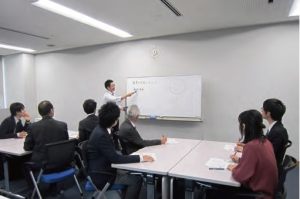
Employer Support Workshop
3.Services for Persons with Disabilities and Employers
Support Offered by Job Coaches
In order to assist persons with mental disabilities and persons with developmental disabilities in smoothly adjusting to the workplace, job coaches visit workplaces to workplaces to provide direct and professional support to such persons and their employers based on individual disability traits.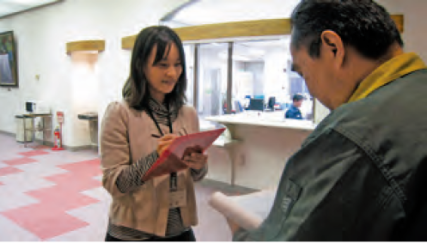
Job coaching support
Comprehensive Employment Support for Persons with Mental Disabilities
In cooperation with the attending physicians, the centers provide professional and comprehensive support to employers and persons with mental disabilities to satisfy the various needs of new employment, returning to work, and a continuous employment.1.Support for Returning to Work
The following support is provided to promote a smooth return to work for persons with mental health problems who have been on leave.-
Coordination for returning to work
In consultations with the person with mental health problems, his/her employer, and an attending physician, the centers provide assistance to reach a consensus among the three parties regarding the process and goals of returning to work.
-
"Re-work Support" (Support for returning to work)
Based on the Re-work Support Plan, the centers use job practice and lectures to provide persons with mental health problems with the support required to improve their capacity to adapt, including life rhythm reorganization, improvement in the ability to concentrate and endure, health control, and stress management. The centers provide support also to employers for developing the environment to accept these workers (creation of a re-work plan, education of supervisors and coworkers, etc.).
The trial work experience at the place to which the persons with mental health problems will return is then prepared as a "warm-up" to support their return to work.
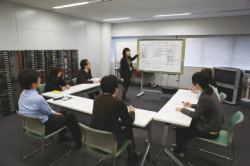
Stress-coping lecture
2.Employment Promotion Support and Support for Continuous Employment
In order for persons with mental disabilities to move forward smoothly with employment and work adjustment, the centers provide work preparation support and work adjustment guidance based on the Vocational Rehabilitation Plan, which is designed according to the individual circumstances. In order for employers to move forward smoothly with the employment and continuation of employment of persons with mental disabilities, the centers provide advice and assistance regarding employment management including recruitment planning, along with work adjustment guidance. According to their needs, the centers also provide support by job coaches and follow-up services in order to continue a stable employment for people with mental disabilities.4.Services for relevant local institutions
Advice and support related to vocational rehabilitation
As the core institutions for vocational rehabilitation services in each region, services are provided in close cooperation with Hello Work and employment support institutions.The centers provide technical advice and assistance related to vocational rehabilitation, including ways of formulating support plans and implementing support as well as methods of coordinating with other organizations to the relevant institutions such as Employment and Life Support Centers for Persons with Disabilities and work transition support providers.
Professional Training for Vocational Rehabilitation
1.Basic training on supporting the employment of persons with disabilities (launched in 2025)
This is a combination of on-demand training provided by the National Institute of Vocational Rehabilitation (NIVR) and group training provided by the regional centers.
In addition, follow-up training will be provided to supplement the content of each field of basic training and to lead to systematic human resource development.
2.Education and Training of Job Coaches
As part of the job-coach training program, the centers conduct skills training that focuses on practical training at business establishments.
In addition, support training is also conducted for job coaches who have already completed education and training of job coaches and support skills training, aiming to provide practical know-how on work adjustment support. (See p.12.)
Large Region Vocational Centers for Persons with Disabilities/Vocational Ability Development Centers
With vocational counselors and vocational training instructors (Techno Instructors) assigned to these centers, vocational rehabilitation service, including vocational evaluation, guidance and training (Hello Training), are provided in cooperation with the medical rehabilitation facilities.The National Vocational Rehabilitation Center for Persons with Disabilities and the National Kibi-Kogen Vocational Rehabilitation Center for Persons with Disabilities actively take in persons with disabilities from large regions throughout the country who require special support for vocational training (hereinafter referred to as “persons with special support needs”),including individuals with mental disabilities, developmental disabilities, and higher brain dysfunctions, and implement pioneering vocational training.
Based on the results of such activities, vocational training methods and teaching techniques for persons with special support needs are relayed to other vocational ability development centers through opinion exchange meetings to promote vocational training for persons with disabilities. In line with this, efforts are made to raise the general standard of vocational training through support for training course facilities geared towards persons with special support needs.
National Vocational Rehabilitation Center for Persons with Disabilities (Saitama Prefecture)
The National Vocational Rehabilitation Center for Persons with Disabilities consists of the Central Large Region Vocational Center for Persons with Disabilities and Central Vocational Ability Development Center for Persons with Disabilities. In cooperation with the National Rehabilitation Center for Persons with Disabilities located next to the facility, this center conducts vocational evaluation, guidance and training through a unified system with the vocational counselors and vocational training instructors.
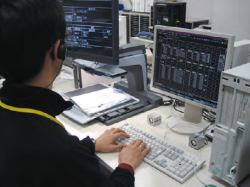
Operation of access software (OA System Course)
Training Sections:
Mechanical drawing, Electronic drawing, Technical operation,Architectural design, DTP/web operations, OA system,Accounting work, and OA clerical work Office Work Logistics and Material Management Assistant Work*1
*1 This course aims to teach the skills and knowledge required to perform auxiliary tasks in service work such as office work, sales, logistics, the restaurant industry, and cleaning (training courses: office assistant, sales and logistics work, and service work).
National Kibi-Kogen Vocational Rehabilitation Center for Persons with Disabilities (Okayama Prefecture)
The National Kibi-Kogen Vocational Rehabilitation Center for Persons with Disabilities consists of Kibi-Kogen Large Region Vocational Center for Persons with Disabilities and Kibi-Kogen Vocational Ability Development Center for Persons with Disabilities. In cooperation with the Kibi-Kogen Medical Rehabilitation Center, which is under the jurisdiction of the Japan Organization of Occupational Health and Safety located on the same premises, this center conducts vocational evaluation, guidance and training through a unified system with the vocational counselors and vocational training instructors.
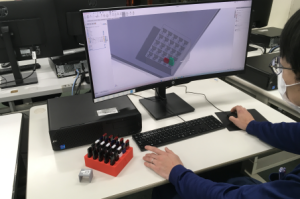
Design using 3D CAD (Mechanical Drawing Course)
Training Sections:
Mechanical drawing, Electronic drawing, System design,Accounting work, OA system, Assistant Work*2
*2 This course aims to teach the skills and knowledge required to perform auxiliary tasks in service work such as office work, sales, logistics, the restaurant industry, and cleaning (training courses: sales and logistics work or service work).


